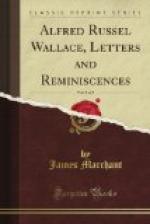A.R. WALLACE.
* * * * *
TO MR. J.W. MARSHALL
Parkstone, Dorset. September 23, 1892.
My dear Marshall,—I am glad you enjoyed Mr. Hudson’s book. His observations are inimitable—and his theories and suggestions, if not always the best, at least show thought on what he has observed.
I was most pleased with his demonstration as to the supposed instincts of young birds and lambs, showing clearly that the former at all events are not due to inherited experience, as Darwin thought. The whole book, too, is pervaded by such a true love of nature and such a perception of its marvels and mysteries as to be unique in my experience. The modern scientific morphologists seem so wholly occupied in tracing out the mechanism of organisms that they hardly seem to appreciate the overwhelming marvel of the powers of life, which result in such infinitely varied structures and such strange habits and so-called instincts. The older I grow the more marvellous seem to me the mere variety of form and habit in plants and animals, and the unerring certitude with which from a minute germ the whole complex organism is built up, true to the type of its kind in all the infinitude of details! It is this which gives such a charm to the watching of plants growing, and of kittens so rapidly developing their senses and habitudes!...—Yours very faithfully,
ALFRED R. WALLACE.
* * * * *
TO PROF. POULTON
Parkstone, Dorset. February 1, 1893.
My dear Poulton,—Thanks for the separate copy of your great paper on colours of larva, pupa, etc.[21] I have read your conclusions and looked over some of the experiments, and think you have now pretty well settled that question.




